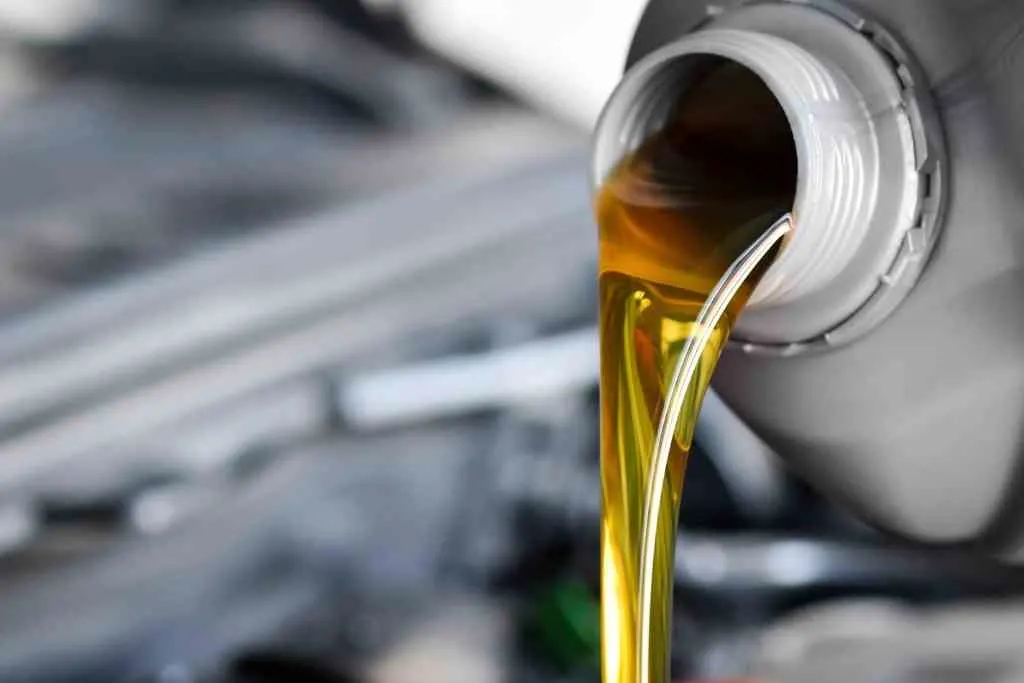Engine oil is essential to our vehicles because it lubricates the engine components that are constantly moving. It protects these parts from wear and tear by minimizing friction.
It’s vital to keep your engine adequately oiled, but if you don’t use that particular vehicle frequently, the oil will end up sitting in the engine for a long time.
What happens then? Does oil go bad sitting in your engine and, if so, how long is too long?
Engine oil doesn’t go bad sitting in the engine. However, the additives that protect and lubricate the engine degrade and become less effective. Acids accumulate the bottom of the sump and water condenses as the exterior temperature changes.
Since the oil pump draws from the bottom section of the sump, you are likely to pump water into the engine once the engine starts.
This effect can cause significant damage to our engines as the water goes through the various oil channels.
Below, I discuss different types of oil, their durability, and their characteristics.
Does Motor Oil Degrade Over Time?
Yes, motor oil degrades after a particular duration. It’s the reason why motor oil manufacturers indicate an expiry date!
With time, the oil loses viscosity and consequently the ability to properly lubricate the engine components.
The rate at which motor oil breaks down depends on the additives present and the type of oil. The hydrocarbons and water in the oil also lead to contamination.
Depending on the car and oil we are using, manufacturers recommend an oil change after about 3,000 to 7,500 miles.
Most mechanics can perform an oil change in less than half an hour for a minimal price.
If you do decide to change your oil yourself, wash your hands very carefully with soap, water, and some sort of abrasive like sand or salt.

Does Synthetic Oil Last Longer?
Yes, synthetic engine oil lasts longer than conventional engine oil.
Synthetic oils do not degrade over time, nor does the viscosity change.
Their base oils are more resistant to heat and oxidation.
The only difference that occurs with frequent usage is that the oil becomes thicker due to contaminants.
Synthetic oil requires fewer oil changes, with longer intervals of up to one year, depending on the specific oil brand.
Some brands recommend an oil change after a mileage of between 10,000 and 15,000, while others can go up to 20,000 miles.
The longevity also depends on factors such as the driving conditions and type of car.
It’s advisable to consult our vehicle’s manual to confirm the recommended oil change intervals.
When you first start using synthetic engine oil, you should have frequent oil changes due to the accumulation of sludge and other deposits.
How Long Can Motor Oil Be Stored?
The longevity of engine oil depends on various factors, such as the type of oil.
Regular motor oil, made using mineral oil, breaks down faster when temperatures are high.
Synthetic oils have thermal properties are can therefore remain stable at high temperatures.
Most engine oils have a shelf life of five years.
It’s essential to check the dates on the oil container, so if the shelf-life indicates a lesser period, stick to that information.
- If the oil is in the original container, the additives degrade after an average of two years, depending on the storage temperature.
- If the container is open, the degradation process is much faster due to oxidation.
The components separate, with some accumulating at the bottom of the container.
The base oils can also become less effective with time, depending on various factors.
How To Tell If Your Motor Oil Is Expired
Here are some useful tips to help us tell whether the motor oil is in good condition or not:
- The first step is to check the expiration date on the container. If it’s past this date, or if the container is older than five years, dispose of the oil. Using it can severely damage our engines or its components.
- If the expiry date is not precise, take a look at the oil’s color. A clear or pale brown color is an indication that the oil is good. A black or dark brown color shows the presence of oxidation. A hazy or milky color means that the oil has some contamination from dirt or water.
- Another factor to look out for is the oil’s consistency. Good oil is easy to pour, so if there is evidence of thickness or stickiness in the oil, this is a sign that the oil will not be effective. If the oil is already inside the engine, check consistency using a dipstick.
- If the oil shows any separation or signs of deposits sitting at the bottom, do not use it. Do not shake the container as those deposits will not dissolve again in the oil.

How Do Base Oils Lose Effectiveness?
The effectiveness of base oils reduces over time due to various factors such as:
#1 Oxidation
Engine oil molecules naturally react with oxygen molecules leading to chemical breakdown.
This oxidation process increases the oil’s viscosity, which reduces its effectiveness.
Sludge and harmful deposits also form, affecting the oil’s efficiency.
#2 High Temperatures
Modern engines operate at higher temperatures, sometimes up to 235 degrees Fahrenheit (113 degrees Celsius).
After every temperature increase of 18 degrees Fahrenheit (8 degrees Celsius), the oxidation rate doubles.
The higher the temperature, the faster the degradation process
#3 Presence of Moisture
Even when stationary, a vehicle’s temperature is bound to change.
Due to this temperature change, water inside the engine condenses and gets contaminated.
If the engine fails to warm up sufficiently, this water doesn’t evaporate and remains within the oil.
Eventually, this polluted water forms sludge.
#4 Loss of Viscosity
Engine oil’s viscosity is vital as it protects the engine components from wear and tear.
By design, our engines perform best when using oil with a particular viscosity.
As the oil degrades, the viscosity reduces, which compromises its effectiveness.
Frequently Asked Questions
Is It Okay to Use Expired Engine Oil?
It’s never advisable to use expired engine oil. The engine damage that could occur will be more expensive than buying new oil.
What Happens if You Fail To Go for Routine Oil Changes?
Ignoring routine oil changes leads to reduced oil effectiveness.
It increases friction between engine parts, encourages warping, rusting, and overheating, which causes permanent engine damage.
What Happens if You Pour Too Much Oil Into Your Car?
When there’s excessive engine oil in the crankshaft, the oil gets aerated to form foam. This foam doesn’t offer proper lubrication and stops the oil from flowing.
The oil becomes overheated and reduces its pressure.
Engine oil manufacturers recommend an oil change after a mileage of between 3,000 and 5,000 miles or a duration of six months.
After an oil change, the vehicle’s gas mileage becomes optimized. Old oil minimizes fuel economy as the engine components are forced to overwork.
If your car remains stationary for an extended period, ensure you check the engine oil’s condition before you start driving.
